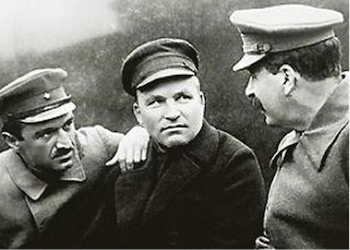

|
Party Purges  From left: Ordzhonikidze, Kirov, and Stalin After 1932 Stalin's policies were tempered by a group of moderate Politburo leaders, such as Kirov and Ordzhonikidze, the Minister of Heavy Industry, who called for an end to the chaos and repression of the Five Year Plan and for more stability. There was a halt in the savage war against the peasantry and the industrial terror. Economic managers were to be made more secure. 'Cadres decide everything!' became the slogan of the Second Five Year Plan (1932-36). Greater emphasis was also placed on material well-being as the goal of Socialism and the Five Year Plan. A good harvest in 1933 eased the food crisis and the pressure on Stalin. Wages were allowed to rise, more consumer goods were put into the shops, and peasants were allowed to keep more livestock on their private garden plots. The regime also gave the appearance of moving towards more legality. Under pressure from the moderates, a Soviet Procuracy was created, and in 1934 OGPU was replaced by the NKVD, which did not have the power to pass death sentences or inflict 'administrative' punishments of more than five years exile. A Politburo commission was set up to investigate OGPU abuses. But Stalin never lost sight of his aim to tighten his grip on the Party and political police, using terror and extra-legal means to destroy his 'enemies'. In April 1933 he announced a general purge of the purge of the Party's ranks. The categories of people specified for purging did not mention groups opposed to Stalin's leadership, but these were clearly the main targets. As a result of the purge, 18 per cent of the Party's 3.2 million members were expelled. Most were new recruits who had joined the Party since 1929 when controls had been relaxed, resulting, it was feared, in the influx of 'careerists' whose loyalty to the leadership could not be trusted. By the Seventeenth Party Congress in 1934, Stalin believed that opposition groups within the Party's ranks had been completely weeded out. He told the congress that the defeat of the opposition was complete. Former critics of his policies, such as Bukharin, Rykov, Tomsky and Radek, had publicly recanted their 'errors' and united behind the party leadership. It was dubbed the 'Congress of Victors'. |
© 2014 Orlando Figes | All Rights Reserved